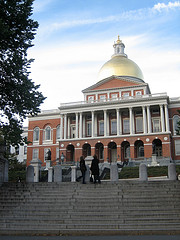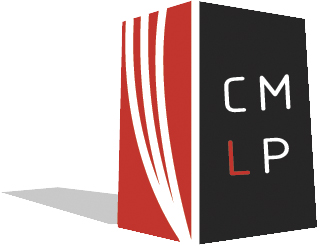Shield Laws
Senate Shield Bill Is Actually Pretty Broad
In re Search of Email Account [Redacted]@gmail.com
As State Shield Laws Play Tug-of-War, the Dream of a Federal Shield Law Resurfaces
Who is a Journalist? Here We Go Again…
"Newsgathering in Massachusetts" Guide Now Available Online!
Copyright 2007-25 Digital Media Law Project and respective authors. Except where otherwise noted,
content on this site is licensed under a Creative Commons Attribution-Noncommercial-ShareAlike 3.0 License: Details.
Use of this site is pursuant to our Terms of Use and Privacy Notice.
content on this site is licensed under a Creative Commons Attribution-Noncommercial-ShareAlike 3.0 License: Details.
Use of this site is pursuant to our Terms of Use and Privacy Notice.



 An amended bill
An amended bill A recent challenge to a subpoena for a New York reporter's confidential source highlights the risks journalists face when different state shield laws clash. Although uniform state shield laws would reduce uncertainty for reporters on the state court level, a solution to varying federal court tests may appear in the form of a
A recent challenge to a subpoena for a New York reporter's confidential source highlights the risks journalists face when different state shield laws clash. Although uniform state shield laws would reduce uncertainty for reporters on the state court level, a solution to varying federal court tests may appear in the form of a  In the wake of the
In the wake of the 
 A federal judge's ruling that a blogger was not covered by Oregon's reporters' shield law
A federal judge's ruling that a blogger was not covered by Oregon's reporters' shield law  On a motion for reconsideration, an Illinois trial judge who
On a motion for reconsideration, an Illinois trial judge who  Federal Judge Marco A. Hernandez got a lot of attention and cyberchatter late last year when he held that blogger
Federal Judge Marco A. Hernandez got a lot of attention and cyberchatter late last year when he held that blogger  A few weeks ago,
A few weeks ago,  There's been a lot of buzz online (and now
There's been a lot of buzz online (and now A North Carolina trial court
A North Carolina trial court  A filmmaker's fight against an oil company seeking his raw documentary footage has spurred a national debate on the
A filmmaker's fight against an oil company seeking his raw documentary footage has spurred a national debate on the  The
New Hampshire Supreme Court today issued an important
The
New Hampshire Supreme Court today issued an important  This morning, the Supreme Court of New Hampshire handed down an important
This morning, the Supreme Court of New Hampshire handed down an important 
Description:
James Rosen is a national news journalist for the Fox News Channel. On June 11, 2009, Rosen published an article on www.foxnews.com entitled "North Korea Intends to Match U.N. Resolution with New Nuclear Test." His Gmail email account is referenced in the case's court documents as "Redacted@gmail.com."
On May 28, 2010, Reginald B. Reyes, a Special Agent for the FBI filed an application for a search warrant for James Rosen's Gmail account, which was maintained by servers located at Google's headquarters in California. The search warrant application stated that the emails concealed information which, under Fed. R. Crim. P. 41(c), contained: (1) evidence of a crime; (2) contraband, fruits of crime, or other items illegally possessed; and (3) property designed for use, intended for use, or used in committing a crime. The warrant application stated that the search was related to a violation of 18 U.S.C. § 793, which governs the "gathering, transmitting or losing defense information."
The search warrant application included an affidavit by Agent Reyes in support of the search warrant. Reyes' affidavit said the warrant was pursuant to 18 U.S.C. § 2703 and 42 U.S.C. § 2000aa and permissible as the U.S. District Court for the District of Columbia has jurisdiction over the offense under investigation. Reyes states that he believes there is probable cause that Rosen violated Section 793(d) as an aider and abettor and/or co-conspirator to Stephen Kim.
That same day, a search and seizure warrant was issued by a U.S. Magistrate Judge to be executed on or before June 11, 2010. The warrant granted the search of electronic e-mails and other electronic data of Rosen's account, and permitted the officer executing the warrant to delay notice to Rosen for 30 days under 18 U.S.C. § 2705. An attachment to the issued warrant stated that Google, Inc. was not permitted to notify "any other person, including the subscriber(s) of Redacted@gmail.com" of the warrant's existence. Google, Inc. was required to make exact duplicates of all information from the email account and send this information to Agent Reyes in overnight mail or facsimile. The attachment asked for any commuications between Rosen's account and 3 other accounts, including anothe Gmail account and two Yahoo! mail accounts; the usernames of all three accounts are also redacted in the public record. The warrant attachment referenced Rosen's connection to Stephen Kim, who was under investigation by the FBI for allegedly telling a reporter that North Korea may test a nuclear bomb.
On May 21, 2013, the government filed a motion to unseal entire docket of Rosen's case, including the application for the search warrant, the attachment to the warrant, Reyes' affidavit, and the granted warrant, with only names and dates of birth redacted for privacy reasons.
On May 22, 2013, the court granted the government's motion in a memo and order that directed the case to be a matter of public record. The memo detailed clerical errors which stalled the placement of the redacted warrant and related materials into public record. The memo apologized for the administrative errors and instituted the inclusion of a new tab on the Court's website solely for the publication of search warrants. Executed warrants will be part of the public record unless a "separate sealing order is entered to redact all or portions" upon a showing by the government as required by United States v. Hubbard, 650 F.2d 293 (D.C. Cir. 1980) and Washington Post v. Robinson, 935 F.2d 282 (D.C. Cir. 1991).
In a separate order that same day, the court ordered that the Clerk place on the public docket a redacted version of the government's motion to unseal entire docket and that the government produce unredacted versions of all unsealed material to the defense in United States v. Stephen Jin-Woo Kim.
-->